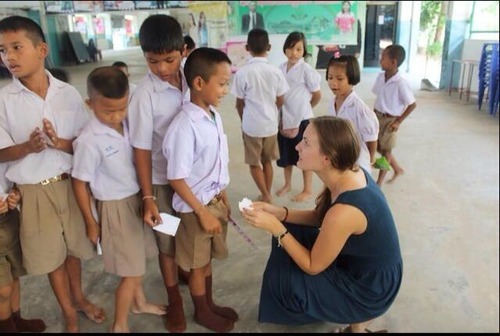By Emily:
As my year in graduate school wound down, I began to again face the burdens of reality – finding a job. I had completed my Masters degree in Applied Positive Psychology, but it soon became apparent that no one was hiring a “positive psychologist”. I felt my skills were so relevant for any field, but no company could quite understand what I had offer to their employees. I was empowered by my education at Penn but discouraged by the lack of opportunities to apply my knowledge in the world.
The more I searched for a job, the less certain I became of what the next year would hold for me. During my time at Penn I had been working in the Positive Psychology Center on a host of research projects. I began working with Alejandro Adler, PhD Candidate, on his work in education for well-being in Bhutan and Nepal. This work took me to Nepal last February to train teachers in positive psychology concepts that could increase the well-being of students. This work engaged me, I felt a true sense of meaning and purpose when I was working for Alejandro but I couldn’t see how this work could translate into a job for the next year.
It was then that I met Zubin in late April at a dingy and utterly delicious India restaurant in West Philadelphia and had a lunch that shaped the course of my future. Zubin had founded S.E.E.K.H.O, an NGO in Bihar, India, to empower local communities and revolutionize the educational system. Over naan and tikka masla, Zubin and I created an outline that could increase S.E.E.K.H.O’s impact by incorporating positive psychology principles. As I left lunch that day I knew that I had found the perfect way to incorporate my passion for positive psychology into tangible positive change in the world.
Since our first meeting, I have joined together with a team of amazing people — Jason House, Arpit Shah, Siddhi Sundar, Alejandro Adler, Ankit Shah, Sam Brundrett, Darryle Ulama — to create a culture of well-being that will empower rural communities in India. Come January I will be moving to Bihar to train teachers in a well-being curriculum based on gratitude, mindfulness, strengths, and building positive relationships.
But to create this movement, we need to plant some serious seeds. We’re training teachers. We’re involving the youth of India. We’re bringing computers to the village. We’re building libraries and learning centers. We’re changing things to make way for bigger change very soon.
And we’re already seeing results. So far, we’ve already successfully given 600 dropout students the means to become literate and numerate—but more importantly, the confidence to want to start attending school again.

